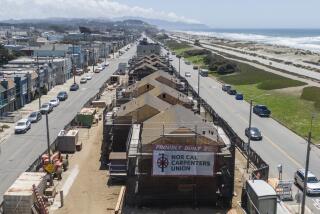Housing market may be nearing equilibrium, latest price numbers indicate
Reporting from Washington — Nationwide, the average price of both new and existing homes sold in the second quarter fell 1% from the same quarter a year ago, according to the latest government figures.
Among the country’s 32 largest metropolitan areas covered in the survey by the Federal Housing Finance Agency, 16 showed price increases and 16 registered declines.
If the four markets with the largest declines -- Las Vegas, Detroit, Phoenix and Orlando, Fla. -- were removed from the quarterly study, the average sales price nationally actually rose 2.4%.
Most of the activity in those four cities is distressed sales. And sales made under duress are often not comparable to regular arm’s-length transactions in which buyers and sellers come to a meeting of the minds.
But even including these four places, the second-quarter decline is less than the 2.7% drop in the first quarter of this year or the 5.2% slide in the fourth quarter of last year.
Consequently, the Federal Housing Finance Agency’s latest numbers are another indication that the housing market may be nearing equilibrium.
Of course, both buyers and sellers should take national figures reported in this or any other survey with a grain of salt. Far more important is what’s going on locally.
Even though the average fell 3.9% in San Francisco in the second quarter, the Bay Area remains the nation’s priciest city for housing. But at $598,200, the average is now below $600,000. Last year it was $622,700.
In something of a surprise, Seattle is the country’s second-most-expensive market. The average in the Puget Sound region is $498,600, an increase of 6.6% from $467,700.
Portland, Ore., the other big Pacific Northwest market, moved into the seventh spot on the top 10 list. The average there rose 17.6% to $426,800 from $362,900.
The average price fell 3.9% in San Diego, dropping to $494,200 from $514,500 and making it the third-priciest city.
Los Angeles comes in fourth, even though the average fell 2% to $470,900 from $480,700.
(Another big California market, Sacramento, has slipped out of the top 10, even though the average there rose 6.5% to $332,800 from $312,600.)
Washington is fifth with an average price of $466,400, down 3.6% from $483,800. New York is sixth at $458,700, off 0.3% from $460,200.
After No. 7 Portland comes Boston at $402,600, down 3.3% from $416,300; Chicago at $374,100, up 14% from $328,300; and Denver at $344,600, a gain of 9.6% from $314,500.
Of the 10 most expensive markets, only four showed higher year-over-year prices in the quarter. The other six registered negative numbers.
At the other end of the price spectrum, Detroit is the least expensive big-city market for housing. The Motor City is suffering from the slump in the auto market and other manufacturing sectors, and as a result, the average fell 16.2% to $158,400 from $189,100 .
In Las Vegas, often held up as the poster child for real estate excess, the average nose-dived 43%. The desert city is now the second least expensive of the 32 major markets. The average price is $181,400. Just 12 months ago, it was $319,700.
The more traditional low-cost markets are third and fourth on this list. In St. Louis the average is $210,500, down 13.3% from $242,900, and in Indianapolis it is $217,300, up 3.8% from $209,400.
Orlando rounds out the bottom five at $220,800. A year ago, it was $307,400. That represents a drop of 28.2%.
Of the 16 places where prices fell in the three-month period from April through June, the decline in Las Vegas was the largest. Prices also plummeted 24% in Phoenix.
Distributed by United Feature Syndicate Inc.
More to Read
Inside the business of entertainment
The Wide Shot brings you news, analysis and insights on everything from streaming wars to production — and what it all means for the future.
You may occasionally receive promotional content from the Los Angeles Times.










